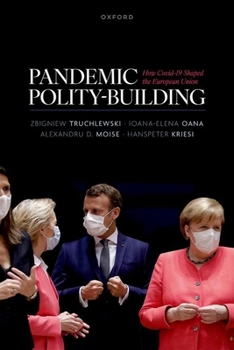Pandemic Polity-Building: How Covid-19 Shaped the European Union
In 2020, the European Union faced the COVID-19 crisis. This book tells the unlikely story of how the European Union survived a crisis that arrived on the heels of a difficult decade during which the EU wrestled with repeated crises, from the Euro Area, to refugees, populism, and geopolitics. Against all odds, a divided polity with a weak centre and low competences in crucial policy domains, managed to overcome powerful disincentives to coordinate its way out of the pandemic and create central capacity building. Pandemic Polity-Building argues that this puzzling outcome stems from COVID-19's crisis characteristics and the EU's polity features. The relative symmetric nature of the pandemic and the deeply disruptive economic shocks revealed the potential long-term externalities of a lack of joint action at the European level. The EU coordinated a common vaccine procurement scheme and pooled its fiscal firepower. The polity perspective presented here shows how the EU overcame conflicts and managed to coordinate and create new capacity in its centre while relying on a new geography of solidarity within the EU. The polity approach allows the authors in this volume to show how the EU did not take a federal path to polity formation. Instead, it moved towards a polity that serves as an imperfect but solidaristic safety net for its member states. The polity approach thus allows this volume to present a firm analytical grasp over the complex crisis politics unleashed on the EU's compound polity. This is an open access title available under the terms of a CC BY-NC-ND 4.0 International licence. It is free to read at Oxford Scholarship Online and offered as a free PDF download from OUP and selected open access locations.
Format:Hardcover
Language:English
ISBN:0198951515
ISBN13:9780198951513
Release Date:September 2025
Publisher:Oxford University Press
Length:320 Pages
Customer Reviews
0 rating





